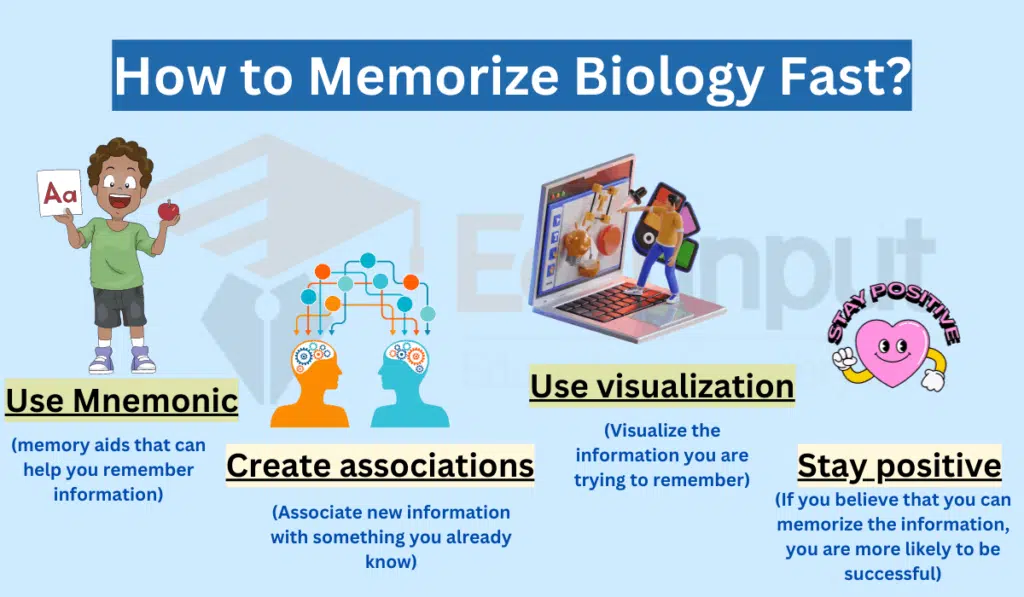How to Memorize Biology Fast?
There is no one-size-fits-all answer to this question, as the best way to memorize Biology fast will vary depending on the individual and the material that needs to be memorized.
Most importantly, believe in yourself and your ability to succeed. If you believe in yourself, you are more likely to achieve your goals.

Also Learn How to Learn Biology on Your Own?
8 Ways to Memorize Biology Fast
Here are some ways that can help you understanding biology’s complicated processes easily. Follow these strategies to memorize biology fast:
1. Mnemonic devices
Mnemonic devices are memory aids that can help you remember information.
- Acronyms: HOMES is an acronym for the names of the five Great Lakes (Huron, Ontario, Michigan, Erie, and Superior).
- Rhymes: “King Philip Came Over From Great Spain” is a rhyme that can be used to remember the order of the taxonomic levels: kingdom, phylum, class, order, family, genus, species.
2. Create associations
Associate new information with something you already know.
- Visual associations: You could associate the Krebs cycle with a Ferris wheel, as both are cyclical processes.
- Meaningful associations: You could associate the structure of DNA with a ladder, as both have two strands that are held together by base pairs.
3. Use visualization
Visualize the information you are trying to remember. This can help you create a mental image that you can recall later.
- Visualize the process: You could visualize the process of photosynthesis, as it is a complex process that is easier to understand if you can see it happening.
- Visualize the structure: You could visualize the structure of a cell, as it is a complex structure that is easier to understand if you can see it.
4. Practice regularly
The more you practice, the better you will remember the information.
- Quiz yourself: You could quiz yourself on the material you are trying to memorize.
- Explain the material to someone else: You could explain the material you are trying to memorize to someone else. This will help you solidify your understanding of the material.
5. Take breaks
Don’t try to memorize everything all at once. Take breaks throughout the day to avoid getting overwhelmed.
- Take a short break every 20-30 minutes: This will help you stay focused and avoid getting overwhelmed.
- Take a longer break every hour or two: This will give your brain a chance to rest and consolidate the information you have learned.
6. Get enough sleep
Sleep helps consolidate memories, so getting enough sleep is important for long-term memorization.
- Get 7-8 hours of sleep per night: This will help your brain to function at its best and to consolidate memories.
- Avoid caffeine and alcohol before bed: These substances can interfere with sleep.
7. Eat healthy foods
Eating healthy foods can help improve your cognitive function, which can make it easier to memorize information.
- Eat plenty of fruits, vegetables, and whole grains: These foods are good for your brain health and can help improve your cognitive function.
- Avoid processed foods, sugary drinks, and excessive amounts of caffeine and alcohol: These foods can harm your brain health and make it harder to memorize information.
8. Stay positive and motivated
If you believe that you can memorize the information, you are more likely to be successful.
- Believe in yourself: If you believe that you can memorize the information, you are more likely to be successful.
- Set realistic goals: Don’t try to memorize everything all at once. Set small, achievable goals for yourself.

 written by
written by 
